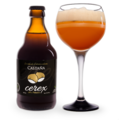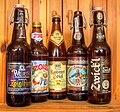Portal:Beer
Introduction

Beer is an alcoholic beverage produced by the brewing and fermentation of starches from cereal grain—most commonly malted barley, although wheat, maize (corn), rice, and oats are also used. The grain is mashed to convert starch in the grain to sugars, which dissolve in water to form wort. Fermentation of the wort by yeast produces ethanol and carbonation in the beer. Beer is one of the oldest alcoholic drinks in the world, the most widely consumed, and the third most popular drink after water and tea. Most modern beer is brewed with hops, which add bitterness and other flavours and act as a natural preservative and stabilising agent. Other flavouring agents, such as gruit, herbs, or fruits, may be included or used instead of hops. In commercial brewing, natural carbonation is often replaced with forced carbonation.
Beer is distributed in bottles and cans, and is commonly available on draught in pubs and bars. The brewing industry is a global business, consisting of several dominant multinational companies and many thousands of smaller producers ranging from brewpubs to regional breweries. The strength of modern beer is usually around 4% to 6% alcohol by volume (ABV).
Some of the earliest writings mention the production and distribution of beer: the Code of Hammurabi (1750 BC) included laws regulating it, while "The Hymn to Ninkasi", a prayer to the Mesopotamian goddess of beer, contains a recipe for it. Beer forms part of the culture of many nations and is associated with social traditions such as beer festivals, as well as activities like pub games. (Full article...)
Selected articles -
Blackrocks Brewery is a craft brewery in Marquette, Michigan, United States. Former pharmaceutical salesmen David Manson and Andy Langlois opened Blackrocks in 2010, taking the name from a local landmark. They originally brewed their products in the basement of a Victorian-style house and used the building's other two floors as a taproom.
By 2013, persistent demand for Blackrocks' beer led Manson and Langlois to add an outdoor patio and increase their brewing capacity. This included purchasing and converting a nearby former Coca-Cola bottling plant. In the early 2020s, they expanded the brewery's taproom into an adjacent property to double its available indoor area. As of 2024[update], Blackrocks is the largest craft brewery in Michigan's Upper Peninsula. Their most popular beer is 51K, an American IPA. (Full article...)
Selected brand -

Three Horses Beer (better known locally as THB) is a pale lager that has been brewed by Star Breweries of Madagascar since 1958. It is the highest-selling beer in Madagascar and has been described as emblematic of the country. THB is sold nationwide and, since 2005, has been exported to such markets as France, Reunion Island, Comoros, and Mayotte. The Malagasy beer is produced at two breweries in Madagascar, the first centrally located in Antsirabe and the other in the northern city of Antsiranana. THB Pilsener, the most common variant of THB, has a light taste and is produced from mostly local barley, corn, and hops. Star Breweries also produces THB Fresh (a shandy with less than 1% alcohol), THB Special (6.2% alcohol), and THB Lite (1% alcohol). Recent investments in Star Brewery infrastructure have allowed a 20% increase in production since 2011.
After advertising alcohol in the media was banned under former President of Madagascar Marc Ravalomanana, Star Breweries has increasingly promoted THB through unconventional means. These have included sponsoring the THB Champions League, Madagascar's national football championship, and holding annual beer festivals. In addition, THB is a regular sponsor of local musicians through major annual festivals and tours. Star Breweries has also hired musicians to perform in music videos created to promote the beer. In 2014 the THB label was significantly redesigned, and in 2015, a new slogan, "THB eo foana e!" ("THB always!"), was promoted alongside the beer's longstanding trademark Soa Ny Fiarahantsika ("The Pleasure of Being Together"). Malagasy musical stars and other public figures regularly promote the beer. (Full article...)
Selected biography -

Mads Ellef Langaard (3 May 1815 – 23 March 1891) was a Norwegian brewery owner and industrialist. He was the founder of the brewery Frydenlunds bryggeri, now a division of Ringnes. (Full article...)
Did you know (auto-generated) -

- ... that weightlifter Wu Tsai-fu drank six huge glasses of beer to help himself urinate for a drug test?
- ... that the FBI's first successful use of silver nitrate to identify fingerprints was in solving the kidnapping of a brewery executive?
- ... that the patu clubs on the New Zealand threepence were compared to bottles of ginger beer?
- ... that almost 45 percent of Taiwan's beer purchases come from rechao restaurants?
- ... that a beer named after the barley variety Golden Promise was not brewed using the variety?
- ... that the offices of Hamm's Brewery in Saint Paul, Minnesota, were built on the site of the city's third cathedral?
Selected brewery -
Younger's Brewery (William Younger & Company) was a brewery in Edinburgh. Established in 1749, it became one of the city’s main commercial enterprises, supplying domestic and foreign markets.
In 1931 Younger's merged with McEwan’s to form Scottish Brewers, which in turn merged with Newcastle Breweries in 1960 to form Scottish & Newcastle. By the late 1960s the combine employed the largest single workforce in the city. (Full article...)
Selected image -
General images
Beer topics
Categories
Selected quote -
| “ | Beer is proof that God loves us and wants us to be happy. | ” |
| — Ben Franklin |
Related portals
Beer lists
Things you can do
This list is transcluded from the tasks list page, to edit, click here
This is a list of single time tasks that need action. Once you have completed them, please remove them from the list.
 |
Here are some tasks awaiting attention:
|
WikiProjects

WikiProject Beer is an association of Wikipedians with an interest in beer and beer-related subjects. They have come together to coordinate the development of beer and brewery articles here on Wikipedia. Additionally, other groups have formed other projects that entertain subjects that are directly related to beer, bartending and pubs. Additionally, the mixed drinks project covers topics that include beer cocktails. If any of these subjects pique your interest, please feel free to visit their projects. These groups would love to have you participate!
| Parent project: WikiProject Food and Drink | |
| Child projects: | Task forces: (All inactive) |
|
|
| Related projects: | |
Associated Wikimedia
The following Wikimedia Foundation sister projects provide more on this subject:
-
Commons
Free media repository -
Wikibooks
Free textbooks and manuals -
Wikidata
Free knowledge base -
Wikinews
Free-content news -
Wikiquote
Collection of quotations -
Wikisource
Free-content library -
Wikiversity
Free learning tools -
Wiktionary
Dictionary and thesaurus
More portals





































































